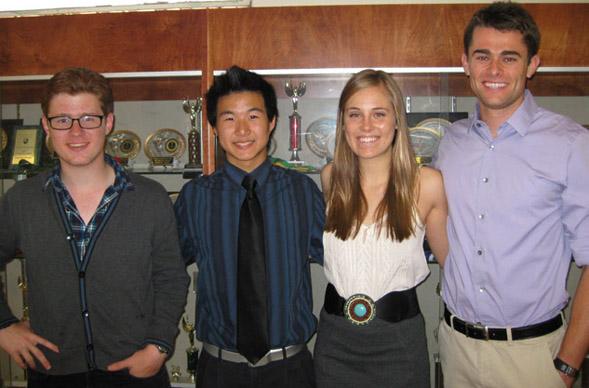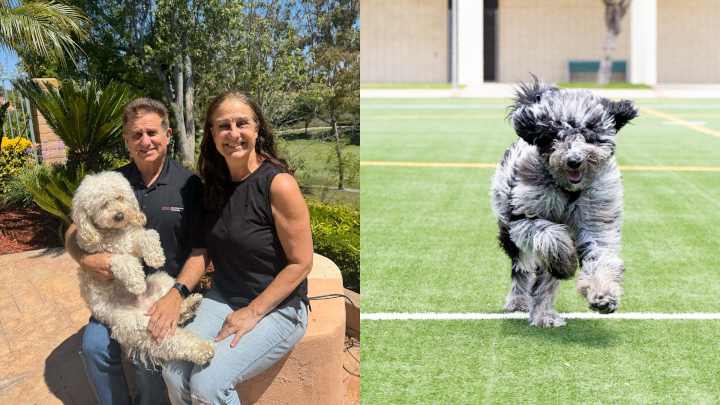Aztec Debate Makes its Mark in 2012
A successful year of Aztec Debate marks a promising future.

Aztec Debate had one of those years only dreamed of.
“It just clicked,” said Sharon Taylor, director of San Diego State University's forensics program.
After a hiatus due to budget constraints, the newly re-constituted arm of policy debate started off the tournament season with a first place win.
The parliamentary arm of debate continued its long history of winning and for the first time in the history of the program advanced to elimination rounds at the National Parliamentary Debate Association tournament.
History of Aztec Debate
Started in the mid 1940s, Aztec Debate is one of the oldest organizations on campus. SDSU still holds the national record for consecutive qualifications to the National Debate Tournament.
Former debaters who currently work in public administration, criminal justice, education, journalism and other leadership careers acknowledge that the skills they learned in the forensics program were critical to their success.
Many are giving back to the program, providing financial support for debate coaches and expenses related to competition travel.
Team competitions
The debate team is organized through the School of Communication, but open to all SDSU students interested in debate, critical thinking, and public speaking.
Competitive academic debate offers competition in a variety of divisions and styles that are separated according to the experience level of the competitors. Debate teams are composed of two speakers and each school may enter multiple teams in any or all levels of competition.
Students are required to do extensive research — often practicing and researching 10-30 hours per week. The program had 40 students in the 2011-12 academic year competing in three wings of debate; parliamentary, policy and Lincoln-Douglas.
Parliamentary debate
Parliamentary debate is different from policy in that it focuses on many topics throughout the year. Known as resolutions, the topics alternate each debate round at a tournament (each tournament can have up to twelve rounds) and are typically announced with only 15-20 minutes’ notice. The topics emanate from current affairs or philosophy and are general enough that a well-educated college student can debate them.
The Aztec Parliamentary Debate team competed in eight tournaments this season, placing first in two tournaments, second in another, and bringing home nine top ten speaker awards. In the fall, the team competed at Point Loma Nazarene and had teams place first, second and third and had four of the top ten speaker awards.
Policy debate
Although there are many formats for collegiate debates, policy debate is the most research intensive format. Debaters across the nation research the same single proposition for each tournament. Before their first debate, students are required to complete detailed research on the topic. By the end of the debate season, students are content experts on the debate topic.
The Aztecs Policy Debate Team started off the season with a first place win at their inaugural tournament. In their first full year of competition after a seven year hiatus due to budget, policy debate brought home seven debate awards (in an eight tournament season), including four first place finishes, and eight top ten speaker awards, two of which were first place finishes.
Policy debater, Andrew Won was recently selected as a member of the All-American Debate team by the Cross Examination debate Association awards committee. Debaters are selected as All-Americans based on “competitive success, academic success, good conduct, and contributions to their squad.”
Won was also named a National Debate Scholar- Magna Cum Laude. National Debate Scholars are “students who maintain strong academic records in addition to their competitive accomplishments.” Won achieved the Magna Cum Laude level for having a GPA above 3.5.
Lincoln Douglas debate
The Lincoln Douglas Debate format is named for the 1858 Lincoln Douglas Debates between Abraham Lincoln and Stephen A. Douglas. In the 40 year history of Aztec Debate, SDSU has never had an individual compete in Lincoln Douglas style debate. This academic year, Alexander James began competing in Lincoln Douglas debate in two competitions he has a first place win and placed fourth in his second showing.
Lincoln Douglas traditionally places a heavy emphasis on logic, ethical values, and philosophy, and in contrast to policy debate does not require vast amounts of statistics or other empirical data. However, in college it resembles one-on-one policy debate requiring similar research practices.
Future of Aztec Debate
When asked about what happens now, Taylor takes a deep breath.
“SDSU debate is the story of David and Goliath,” she said. “We’ve had a tremendous amount of success with the minimum amount of coaches and money (to travel). But our profile has been raised on the west coast; our record speaks for itself.”
Many team members are expected to return next year, and Taylor has received calls from students interested in transferring to and/or applying to SDSU specifically for the debate team. Success breeds interest, but Taylor is concerned about having the resources for a bigger team. A bigger team means more coaches, more computers for research, more money for travel, and more money to support the students — nearly all of whom work part time in addition to a full course load and an additional 10-30 hours per week of research and practice.
“Our focus is on next year and continuing what we’ve started,” said Taylor.



